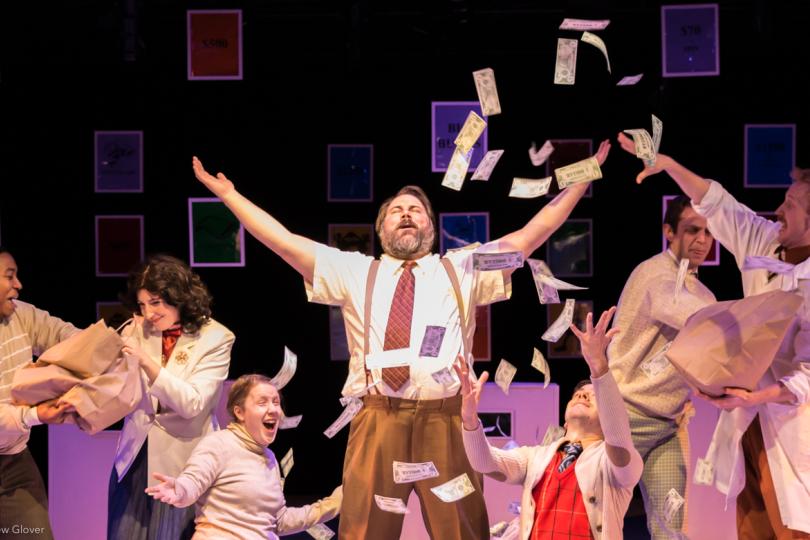Sandbox wins!

Even if you don’t know Michael Larson by name, you’re probably at least a little familiar with the story of the game-show contestant who figured out the pattern of the “Big Board” on Press Your Luck and walked away with a fortune in 1984. I’d guess that a sizable portion of the audience for Big Money will be coming out to Park Square because they want to see the show about the guy they learned about from that This American Life episode or Mental Floss article. That might make Big Money look like a can’t-miss proposition, but when you’re dealing with this strong of a real-life hook, there’s always the risk that the compelling facts will muffle the artistic voice, or vice versa.
Fortunately for all involved, the folks at Sandbox Theatre are as deft as anyone at treading that fine line, and Big Money is a production as thoughtful and insightful as its subject is quirky and juicy. The wheels are in motion even before the show officially begins, as project lead (and Minnesota Playlist columnist) Derek Lee Miller warms up the crowd with a mini game show complete with fabulous prizes. It’s a fun little bonus, but it’s also a way to get theatergoers not only engaged with the experience, but also actively contemplating their roles as audience members and their relationships with the performers.
That mindset bleeds over into the production proper, as light-up “Applause” signs signal the crowd to clap for all of the moments when the Press Your Luck audience celebrated Larson’s winning streak or host Peter Tomarken’s (Derek Mayer) smarmy one-liners. Right out of the gates, everyone is immersed in a performance of a performance of a performance.
That perspective is reinforced by Leazah Behrens’s set design, featuring a replica of the program’s iconic, Whammy-laden Big Board that looms over the play even when the action is half-a-country removed from the CBS studios in Los Angeles. Considering how much Press Your Luck defines Larson’s existence long after his televised peak (and, arguably, also long before it), the omnipresent board seems deeply appropriate.
A towering performance
At the heart of all of this is Michael Larson himself, portrayed here as a cheap con artist and narcissist who’s not as smart as he thinks himself, but also not as far off as the rest of the world might suppose. Peter Heeringa gives a towering performance in the lead, embodying the studied confidence of a man who sees the world as a rigged game whose rules are hidden from all but a clever few. For such an outsized character, Heeringa never goes over the top. That’s partly because Larson’s schemes often require him to pass himself off as a man of no particular consequence, and partly because Heeringa infuses him with something between regret and inevitability.
Larson never seems remorseful about the various crimes and connivances that make up his existence, but in the show’s more poignant moments we can see that he sometimes wishes he was able to live another way, especially where his long-suffering wife (Sarah Parker) and daughter (Emma Larson) are concerned.
More to the story
While Larson’s one-man cult of personality laces the show together, Big Money isn’t exactly a character study. There’s also a running thread about the business of television and the culture of celebrity that collaborated to make Larson’s rise and fall possible. Director Theo Langason and Stage Manager Jaya Robillard keep things frenetic and kinetic, with TV production crews constantly lurking in the wings and scampering around the stage, and Larson frequently breaking the fourth wall to guide us through rapid-fire montages of his various schemes and scams.
There’s so much nervous energy coursing through the production that when the proceedings eventually slide into a full-on song-and-dance number, it feels surprising but not at all out of place. It has the feel of a multi-media artist biopic (and this interpretation of Larson leaves little doubt that he’s some manner of artist) along the lines of the film version of Harvey Pekar’s American Splendor.
A story like Big Money’s would have worked wonderfully as a light recounting of a wacky, very American true story. It’s grand to see that Sandbox aimed higher, creating a fast-paced, funny, energetic, and, ultimately, strangely touching portrait of a life on the edge. Of all the game shows whose codes Michael Larson could have cracked, it’s hard to think of a more appropriately titled one than Press Your Luck.




